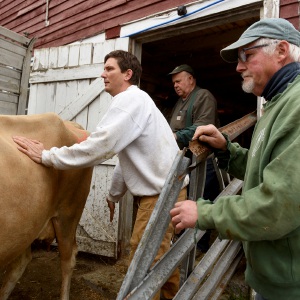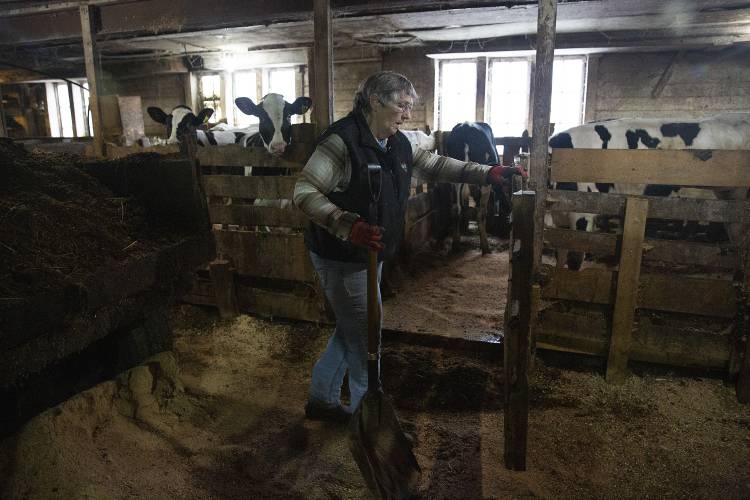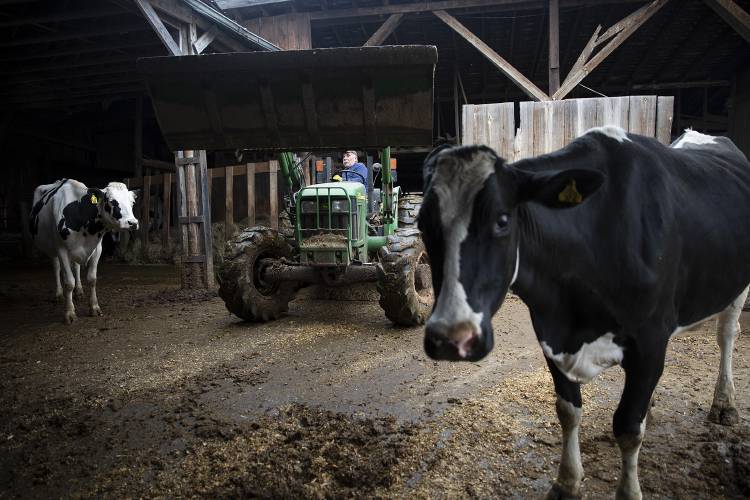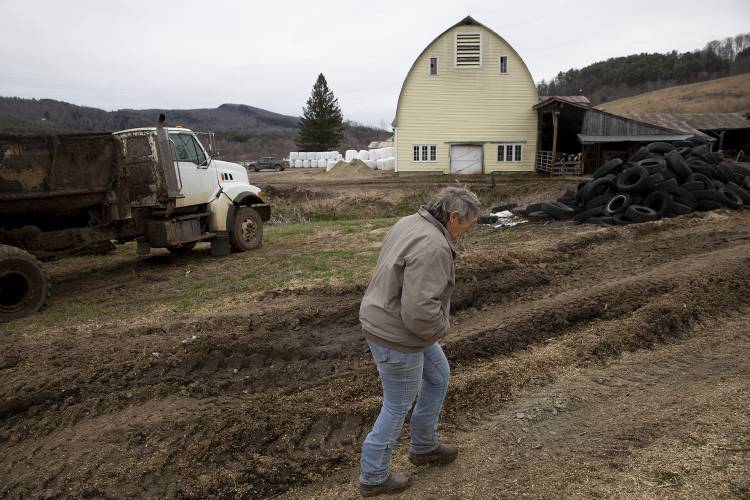Upper Valley farms’ manure piles stack up amid wet weather
| Published: 04-07-2024 5:05 PM |
ROYALTON — While many Upper Valley residents have been contending with piles of snow lately, the region’s dairy farmers have been dealing with teetering piles of another kind — livestock poop.
At Westland Farm, where Peggy Ainsworth grows sweet corn and tends to a small herd of dairy cows, months before the end of the state-mandated “winter manure spreading ban” her manure pit was threatening to “overtop,” Ainsworth said.
“All the rain we had in December really backed things up,” she said, unable to spread growing loads of manure on wet ground at risk of it getting caught in runoff. “Everyone was in the same boat.”
Largely kept in liquid slurry pits across Vermont, manure is stored through the winter to be spread as super-charged fertilizer over hay and cornfields in the summer months. To keep it from winding up in waterways through melting snow or rain, the Vermont Agency of Agriculture Food and Markets established in 2016 a restriction on spreading manure on saturated, snow-covered or frozen fields at any time, as well as an all out ban from Dec. 15 to April 1 – whether a field is frozen or not.
But as climate change continues to wreck havoc on New England’s seasonal calendar, when “winter” ends and begins is a moving target.
Early this spring, Ainsworth was able to get a permit from the agency allowing her to spread manure before the end of the ban on April 1, lowering the level in her pit. “It was dangerously high,” Ainsworth said. “So we spread it down on our cornfield, which wasn’t covered with snow.” She wanted to avoid spreading it in an any fields near White River, which borders her Royalton farm.
While there is an exemption process, the special allowances — which come with stipulations, such as buffers between surface water and public water and maximum gallon levels — are typically issued by the handful, said Laura DiPietro, director of the agriculture agency’s water quality program. “In a normal year that isn’t like this last year, that process is meant to deal with mechanical issues,” DiPietro said.
But this year, farmers were unusually backed up going into the start of the ban.
Article continues after...
Yesterday's Most Read Articles
 Herd departs Hartford’s last remaining dairy farm
Herd departs Hartford’s last remaining dairy farm
 Bald eagles are back, but great blue herons paid the price
Bald eagles are back, but great blue herons paid the price
 At Dartmouth, hundreds protest ongoing war in Gaza and express support for academic freedom
At Dartmouth, hundreds protest ongoing war in Gaza and express support for academic freedom
 Kenyon: What makes Dartmouth different?
Kenyon: What makes Dartmouth different?
 A Life: Richard Fabrizio ‘was not getting rich but was doing something that made him happy’
A Life: Richard Fabrizio ‘was not getting rich but was doing something that made him happy’
DiPietro started hearing from growers around August, in the aftermath of July’s historic flooding. With sopping wet ground, they couldn’t empty their pits even during the time it was allowed. Farmers were “all making decisions not to spread manure — they technically could have — because they said we feel our fields are too wet,” she said.
This year, the agency handed out more than 50 exemptions statewide. “It was a significant challenge going into winter,” DiPietro said.
The conditions are reminiscent of the winter of 2019, when a late October snowstorm prevented farmers from spreading at a time when they’re typically marching full speed ahead in emptying their slurry pits, DiPeitro said. That year, upwards of 60 exemptions were issued, to the ire of some water conservationists.
In addition to the health risks posed to people and animals when manure runs off into waterways, high levels of phosphorous and nitrogen — fertilizing nutrients found in manure — can lead to out-sized algal blooms, disturbing the ecological balance.
Jen Byrne, district manager for the White River Natural Resource Conservation District, said that with wetter years and more erratic winters in mind, the organization will push harder for area farmers to design their fields in ways that better retain runoff. In a system known as “keyline,” designed to the natural contours of a farmer’s land, “we have observed a 50% decrease in runoff,” Byrne wrote in an email.
But while water bodies are endangered by runoff carrying an influx of nutrients, the quality of manure as a fertilizer is impacted by the loss of it.
In samples taken from Addison, Franklin and Orleans County farms, a University of Vermont Cooperative Extension study found “substantial dilution of the slurry manure from excessive rainfall,” with levels of nitrogen, phosphorus and potassium declining in concentration. Phosphorus content fell by nearly 75%. A drop in nutrients in the fertilizer jeopardizes that season’s crop.
Quality, however, it isn’t necessarily top of mind when manure is piling up to threateningly high levels.
“At this point, I haven’t even thought of that,” Ainsworth said on Thursday, having just come inside from the winter storm. “The only thing I’m thinking of right now is how to get the level of that manure pit down to make room for all this snow we’ve got.”
Frances Mize is a Report for America corps member. She can be reached at fmize@vnews.com or 603- 727-3242.




 JAG Productions announces closure, citing ‘crisis facing the arts’
JAG Productions announces closure, citing ‘crisis facing the arts’
